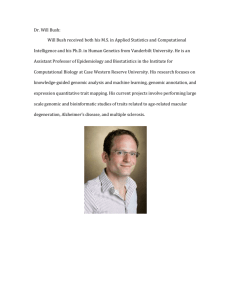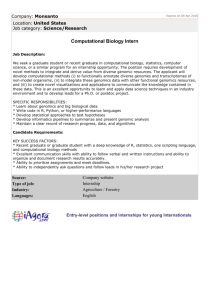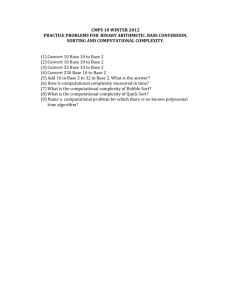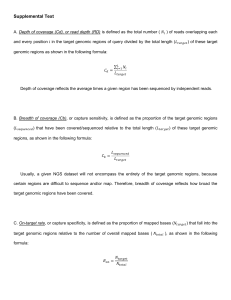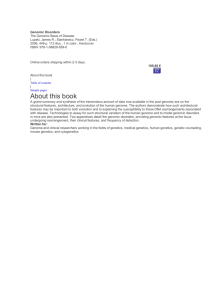kdi_proposal_summary_1998 - The Stanford University InfoLab
advertisement
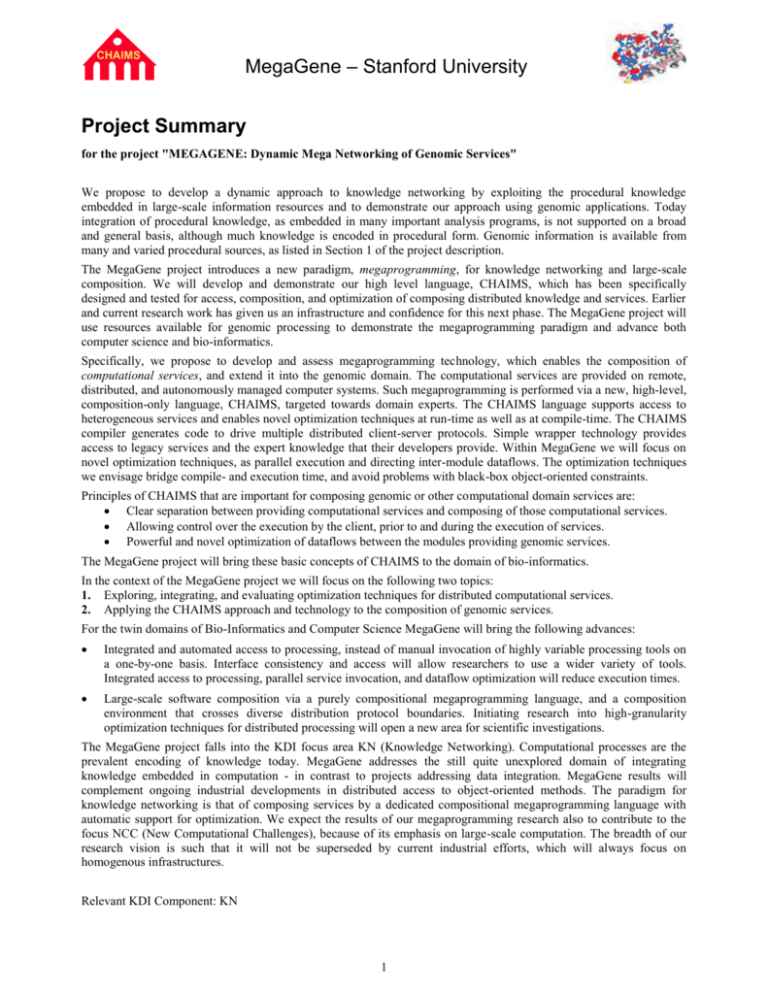
CHAIMS MegaGene – Stanford University Project Summary for the project "MEGAGENE: Dynamic Mega Networking of Genomic Services" We propose to develop a dynamic approach to knowledge networking by exploiting the procedural knowledge embedded in large-scale information resources and to demonstrate our approach using genomic applications. Today integration of procedural knowledge, as embedded in many important analysis programs, is not supported on a broad and general basis, although much knowledge is encoded in procedural form. Genomic information is available from many and varied procedural sources, as listed in Section 1 of the project description. The MegaGene project introduces a new paradigm, megaprogramming, for knowledge networking and large-scale composition. We will develop and demonstrate our high level language, CHAIMS, which has been specifically designed and tested for access, composition, and optimization of composing distributed knowledge and services. Earlier and current research work has given us an infrastructure and confidence for this next phase. The MegaGene project will use resources available for genomic processing to demonstrate the megaprogramming paradigm and advance both computer science and bio-informatics. Specifically, we propose to develop and assess megaprogramming technology, which enables the composition of computational services, and extend it into the genomic domain. The computational services are provided on remote, distributed, and autonomously managed computer systems. Such megaprogramming is performed via a new, high-level, composition-only language, CHAIMS, targeted towards domain experts. The CHAIMS language supports access to heterogeneous services and enables novel optimization techniques at run-time as well as at compile-time. The CHAIMS compiler generates code to drive multiple distributed client-server protocols. Simple wrapper technology provides access to legacy services and the expert knowledge that their developers provide. Within MegaGene we will focus on novel optimization techniques, as parallel execution and directing inter-module dataflows. The optimization techniques we envisage bridge compile- and execution time, and avoid problems with black-box object-oriented constraints. Principles of CHAIMS that are important for composing genomic or other computational domain services are: Clear separation between providing computational services and composing of those computational services. Allowing control over the execution by the client, prior to and during the execution of services. Powerful and novel optimization of dataflows between the modules providing genomic services. The MegaGene project will bring these basic concepts of CHAIMS to the domain of bio-informatics. In the context of the MegaGene project we will focus on the following two topics: 1. Exploring, integrating, and evaluating optimization techniques for distributed computational services. 2. Applying the CHAIMS approach and technology to the composition of genomic services. For the twin domains of Bio-Informatics and Computer Science MegaGene will bring the following advances: Integrated and automated access to processing, instead of manual invocation of highly variable processing tools on a one-by-one basis. Interface consistency and access will allow researchers to use a wider variety of tools. Integrated access to processing, parallel service invocation, and dataflow optimization will reduce execution times. Large-scale software composition via a purely compositional megaprogramming language, and a composition environment that crosses diverse distribution protocol boundaries. Initiating research into high-granularity optimization techniques for distributed processing will open a new area for scientific investigations. The MegaGene project falls into the KDI focus area KN (Knowledge Networking). Computational processes are the prevalent encoding of knowledge today. MegaGene addresses the still quite unexplored domain of integrating knowledge embedded in computation - in contrast to projects addressing data integration. MegaGene results will complement ongoing industrial developments in distributed access to object-oriented methods. The paradigm for knowledge networking is that of composing services by a dedicated compositional megaprogramming language with automatic support for optimization. We expect the results of our megaprogramming research also to contribute to the focus NCC (New Computational Challenges), because of its emphasis on large-scale computation. The breadth of our research vision is such that it will not be superseded by current industrial efforts, which will always focus on homogenous infrastructures. Relevant KDI Component: KN 1
